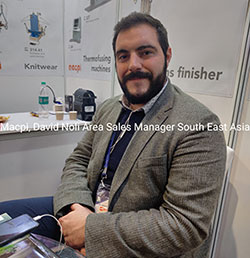"One of the most successful garment machinery manufacturers in India, Macpi offers a wide range of machines to its clients. David Noli, Area Sales Manager of the Macpi Group elaborates on the company, its products and operations"

Starting as a manufacturer of formal wear, shirts and suits, over the years Macpi has progressed to offering garment logistics, stitch free and bonding technologies and laundry to health care institutions. “We provide various innovative solutions to our customers,” says David Noli, Area Sales Manager of the group.
Known for its vision to stay at 20 years ahead of the market, Macpi has been promoting fully automatic systems since the 80’s. “That was the time when everybody was still using manual machines. We provided customers with the latest technologies and products. We function not just as a supplier but as a partner to our clients. We help them avoid mistakes and overcome their inefficiencies,” asserts Noli. The automatic systems used by the company help it to recreate its computer workflow. Its machines are eco-certified and save both power and energy.
According to Noli, though stitching plays an important role in garment making, it’s time to give bonding and stitch free technologies a chance. “This will allow us to develop new styles,” he says. This technology is showcased in several machinery exhibitions. “However, designers are hardly aware of them. This creates a gap between technology inventors and the final users. We need to bridge this gap,” notes Noli.
To implement the Industry 4.0 solution, industry leaders need to invest more time on their customers. “They should be allowed to build their own structure around this concept,” states Noli further adding, “customers won’t trust you if you merely speak about the technology.”
According to Noli, three emerging global apparel markets include Vietnam, Bangladesh and Ethiopia. While Vietnam was earlier a sub contractor of China for suits and high-end garments, it can now develop its own industry. On the other hand, Bangladesh is involved in manufacturing shirts and light knits. “With sufficient support, both these countries will continue to grow. For instance, Italy, which was earlier a subcontractor for Europe and the US, later developed its own manufacturing label,” adds Noli.
The trade war affects everyone. “Suddenly, buyers realise that they can’t depend on any one country. This affects the entire global supply chain as orders spread out and countries start manufacturing according to their area of specialisation,” adds Noli.
It’s becoming increasingly difficult to work in China as workers are no longer interested in machines. “However, the country still offers the best combination of utilities, service and cost,” affirms Noli.
The global economy is moving away from its traditional ways of operations. “Some consumers are demanding low technology goods while others are asking for highly processed goods. There seems to be no mid-way in this,” adds Noli.
Though Brexit will impact logistics in Great Britian, the rest of Europe will not face any problems. The remaining 27 countries will continue to stay together. “Of these, Bangladesh can gain by reinventing its traditional methods of manufacturing. Similarly, Indian brands can approach the US and European markets with their products and under their own names. These brands can use our technologies for making their products,” he states further.
Noli views that the future prospects for the Indian apparel industry are very good. “However, it should not fall into the trap of cheap labor, cheap garments and more business,” adds Noli












